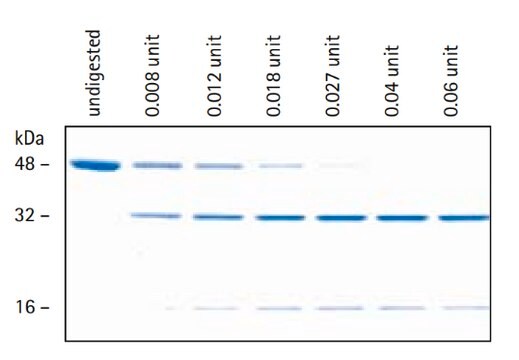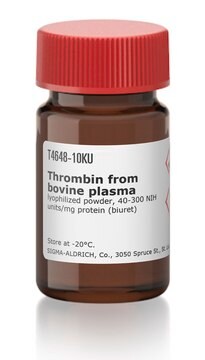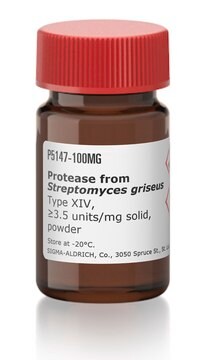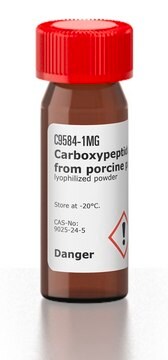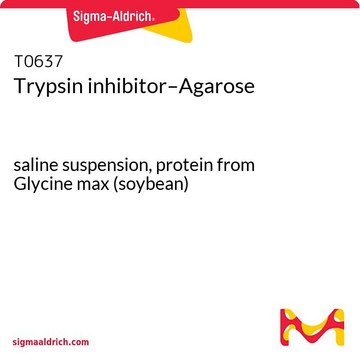E0885
Enterokinase from porcine intestine
lyophilized powder, ≥100 units/mg protein
Sinónimos:
Enteropeptidase
Iniciar sesiónpara Ver la Fijación de precios por contrato y de la organización
About This Item
Productos recomendados
Formulario
lyophilized powder
Nivel de calidad
actividad específica
≥100 units/mg protein
mol peso
150 kDa
purificado por
chromatography
composición
Protein, ≥20% Lowry
actividad extraña
aminopeptidase ≤1.5%
trypsin ≤1%, free
temp. de almacenamiento
−20°C
¿Está buscando productos similares? Visita Guía de comparación de productos
Aplicación
Enterokinase from porcine intestine has been used in a study to investigate complementary DNA cloning and sequencing of rat enteropeptidase. Enterokinase from porcine intestine has also been used to learn more about the insulinotropic region of the gastric inhibitory polypeptide.
The enzyme from Sigma has been used to activate zymogens in order to detect trypsin activity. The study to investigated the structural and evolutionary consequences of unpaired cysteines in trypsinogen. The product has been used to measure trypsin while studying the effect of pesticide induced alterations in gene expression in the lobster, Homarus americanus The enzyme from Sigma has been used to develop a novel assay for measuring levels of lipid-free apoA-I in the presence of lipid-bound apoA-I. Enteropeptidase can specifically cleave human lipid-free apoA-I but not its lipid-bound form resulting in an N-terminal fragment of 22 kDa. It has also been used in a study to examine the effect of calcium and phytic acid on the activation of trypsinogen and the stability of trypsin.
Acciones bioquímicas o fisiológicas
Enterokinase is a membrane bound serine protease that specifically and rapidly converts trypsinogen to trypsin, thereby, triggering the conversion of other zymogens to active enzymes. It has a molecular mass of approximately 150 kDa. The enzyme is a heterodimer consisting of 35-47 kDa subunits. The light and the heavy chains are linked by two disulfide bridges. It is a glycoprotein containing 35% carbohydrate. The polypeptide chain of trypsinogen is hydrolyzed only after an -(Asp)4-Lys- sequence. The enzyme is inhibited by soybean trypsin inhibitor. Enterokinase is typically used in protein modification and amino acid sequence determination.
Definición de unidad
One unit will produce 1.0 nanomole of trypsin from trypsinogen per min at pH 5.6 at 25 °C.
Forma física
Lyophilized powder containing sodium phosphate buffer salts
sustrato
Referencia del producto
Descripción
Precios
Código de clase de almacenamiento
11 - Combustible Solids
Clase de riesgo para el agua (WGK)
WGK 3
Punto de inflamabilidad (°F)
Not applicable
Punto de inflamabilidad (°C)
Not applicable
Equipo de protección personal
Eyeshields, Gloves, type N95 (US)
Elija entre una de las versiones más recientes:
¿Ya tiene este producto?
Encuentre la documentación para los productos que ha comprado recientemente en la Biblioteca de documentos.
W Safi et al.
Journal of lipid research, 42(5), 864-872 (2001-05-16)
Recent studies indicate that certain lipid-poor forms of apolipoprotein (apo)A-I may be particularly important in promoting cholesterol release from overburdened cells in the periphery. However, a detailed understanding of the physiological relevance of these species has been hampered by the
Erzsébet Kénesi et al.
Biochemical and biophysical research communications, 309(4), 749-754 (2003-09-19)
Vertebrate trypsins usually contain six disulfide bonds but human trypsin 1 (PRSS1) contains only five and human trypsin 2 (PRSS2) contains only four. To elucidate possible evolutionary pathways leading to the loss of disulfide bonds, we have constructed mutants lacking
Michael N Horst et al.
Comparative biochemistry and physiology. Part D, Genomics & proteomics, 2(1), 44-52 (2007-03-01)
Using subtractive hybridization, we have identified 17 genes that are either up- or down-regulated in the hepatopancreas (Hp) of the lobster, Homarus americanus, by acute exposure to the juvenile hormone analog methoprene. The expression of some of the genes obtained
Effect of calcium and phytic acid on the activation of trypsinogen and the stability of trypsin.
Caldwell RA
Journal of Agricultural and Food Chemistry, 40 (1), 43-46 (1992)
G W Morrow et al.
Canadian journal of physiology and pharmacology, 74(1), 65-72 (1996-01-01)
Glucose-dependent insulinotropic polypeptide or gastric inhibitory polypeptide (GIP) is a 42 amino acid intestinal hormone, which exhibits several direct and indirect effects on fat and glucose metabolism. To determine the bioactive region(s) of the molecule, synthetic and proteolytic fragments of
Nuestro equipo de científicos tiene experiencia en todas las áreas de investigación: Ciencias de la vida, Ciencia de los materiales, Síntesis química, Cromatografía, Analítica y muchas otras.
Póngase en contacto con el Servicio técnico
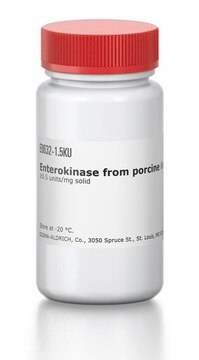

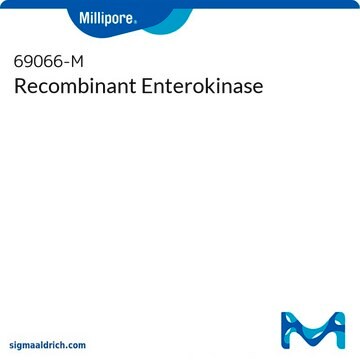
![4-(N-[2,4-Diamino-6-pteridinylmethyl]amino)benzoic acid sodium salt ≥95% (TLC)](/deepweb/assets/sigmaaldrich/product/structures/855/619/06a9574b-3e45-48aa-85c1-2f25917fa5a7/640/06a9574b-3e45-48aa-85c1-2f25917fa5a7.png)
